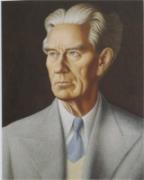|
|
||||||||||||||||||||||||
 |
Featured person
Recently added |
Professor Bob Black (1922 - 2008): |
||||||||||||||||||||||
Professor Black occupied the chair of Economics at Queen’s University, Belfast, and even with his achievements, was especially renowned for his studies on the Irish economy in the nineteenth century.
Black was born in Dublin and educated there, entering the University of Dublin when just 15, gaining a first class honours degree at 21 and obtaining his PhD (on Mountifort Longfield, a mid-nineteenth century Irish economist) when just 23. He was appointed to an assistant professorship, but soon (1945) left for Belfast, where he was Assistant Lecturer in Economics at Queen’s University. In 1962 he was appointed Professor of Economics and Head of Department, posts he would occupy for the remainder of his career.
His principal research interest was in the early- to mid nineteenth century Irish economy, especially as compared to the English economy, which operated very differently, and he sought to show how the government in London failed to grasp, not that the two economies were different, but why they were. This failure of understanding, trying to apply English free trade models to Ireland, had a significance regarding the catastrophe of the Great Famine (1845-1851). An academic colleague in the discipline, Jacob Viner of Princeton University, persuaded Black to produce a book based on this work; he duly published the widely-acclaimed Economic Though and the Irish Question 1817-1870 which appeared in 1960, after nearly a decade in preparation. Though primarily an historical study, it did have a modern relevance: Black was a relativist in Economics, in that he saw economic ideas and policies as having to recognise that to a large extent they will, or should be, based on the particular circumstances and conditions at the relevant time.
(Black had met Viner when on a Rockefeller Foundation Fellowship at Princeton, 1950-1951, where he also got to know some of the world’s leading economists of the day, such as Friedrich von Hayek, George Stigler, and Milton Freidman – all three of whom would later be Nobel Laureates.)
His other major area of interest was the work of WS (Stanley) Jevons, the English economist and logician (1835-1882) much of whose correspondence with JE Cairnes, the contemporary Irish economist he obtained in the National Library of Ireland in Dublin. Again working thoroughly and with masterful scholarship, he published in 1970, an edition of Jevons’ Theory of Political Economy, followed by Papers and Correspondence of William Stanley Jevons, which appeared in seven volumes between 1972 and 1981.
In addition to this widely admired work, Black was author or editor of some 70 publications, including the Centennial History of the Statistical and Social Enquiry Society of Ireland, which appeared in 1947. He was also a founding editor of History of Political Economy, a journal, he produced (in 1969) a Catalogue of Pamphlets on Economic Subjects 1750-1900 in Irish Libraries, a considerable work as such holdings are very extensive.
Outside his purely academic work Black was active administratively within Queen’s University. Apart from his roles mentioned above, he served as Dean of the Faculty of Economics and Social Sciences (1967-1970), and Pro-Vice-Chancellor, (1971-1975) under Sir Arthur Vick. He won a reputation for fairness, modesty and efficiency, which former colleagues still (2013) recall. In the wider community he chaired Committees of Inquiry into Angling, and into wages in the catering industry. His many honours and awards included honorary doctorates form both Dublin University, and Queen’s; he was a Member of the Royal Irish Academy and of the British Academy.
| Born: | 11 June 1922 |
| Died: | 7 December 2008 |
| Richard Froggatt |
| Bibliography: The Times, 9.2.2009; The Irish Times, 3.1.2009; private information |


Home | Our Policies | Plaques | Browse | Search | Sponsors | Links | Help | Contact
Privacy & Disclaimer | Cookie Policy | Site Map | Website Design By K-Point
© 2024 Ulster History Circle









